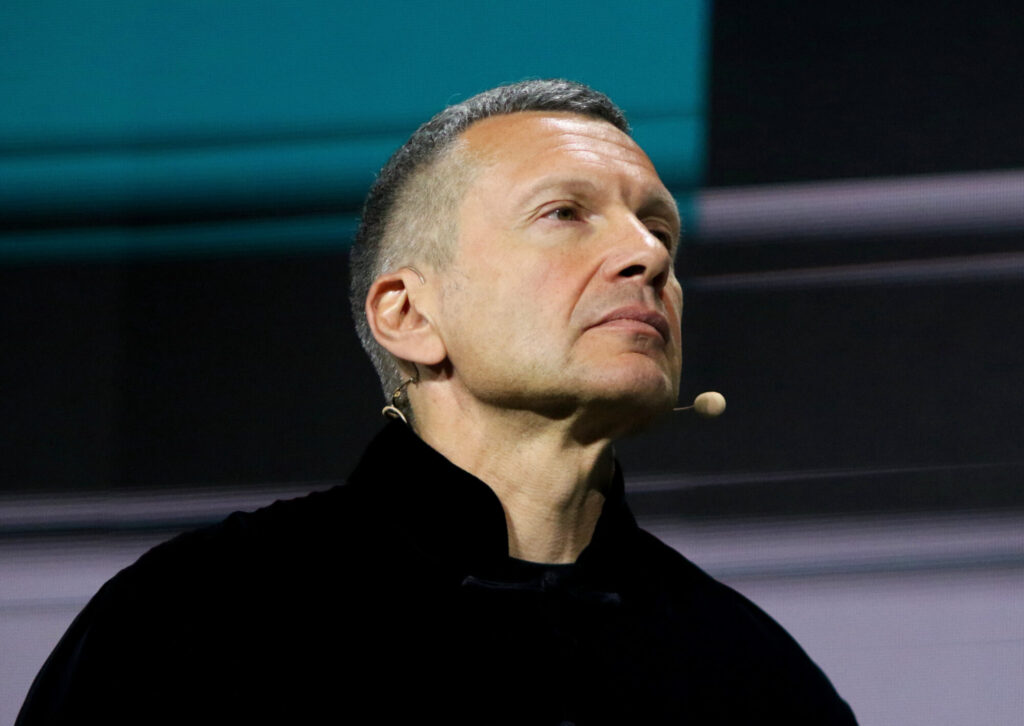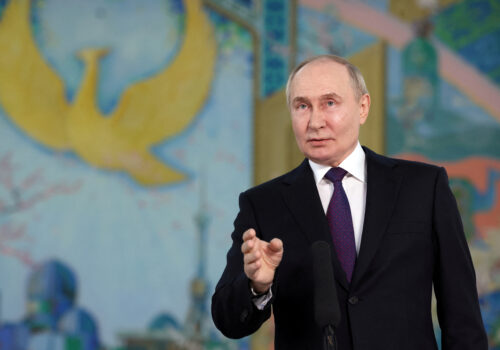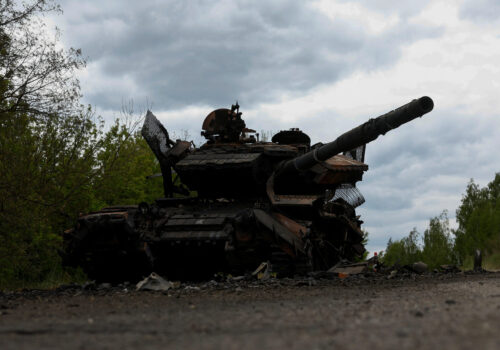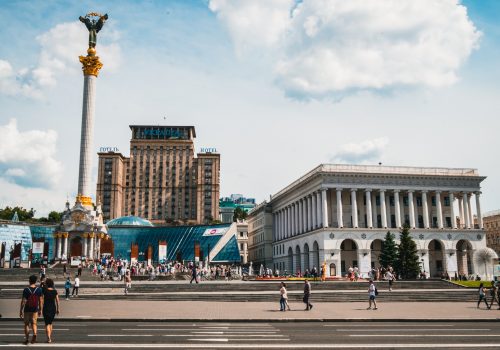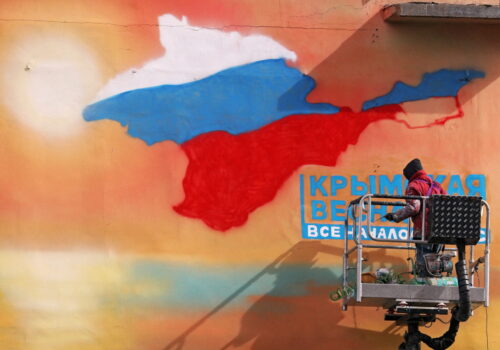
Holding Putin’s propagandists accountable for crimes in Ukraine
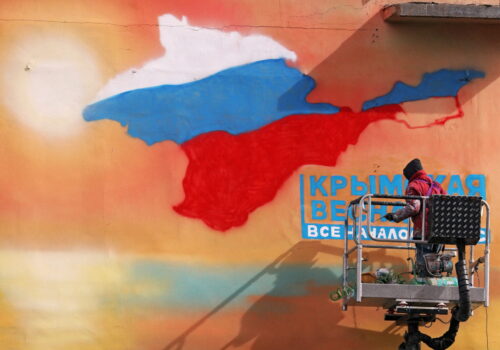
At dawn in May 2020, a French police raid on a sleepy village near Paris ended a 26-year manhunt for one of the Rwanda genocide’s most notorious fugitives. By October 2022, 89-year-old Felician Kabuga was standing trial in The Hague for crimes without a statute of limitations: Genocide, direct and public incitement to genocide, and conspiracy to commit genocide, among other human rights violations. Prosecutors singled out his role as founder of a notorious Rwanda radio station, calling this dehumanizing media a key cause of the genocide.
In early June, new developments in The Hague served as a reminder to key Russian propagandists, including one of Russia’s former presidents, that they may one day face similar charges. As allowed by Article 15 of the Rome Statute, a coalition of non-government organizations jointly submitted a formal Communication to the Office of the Prosecutor of the International Criminal Court (ICC) requesting an investigation into six Russian nationals involved in state propaganda. Notably, this coalition included international and Ukrainian groups, as well as one Russian NGO.
The Communication urged the ICC to investigate the Russians for criminal hate speech. The accused include Dmitry Medvedev, former Russian president and current Security Council Deputy Chairman; Vladimir Solovyov, a popular host on Russian state-owned television channel Rossiya-1; Margarita Simonyan, editor-in-chief of Russia Today; Dmitry Kiselyov, head of the state-owned media consortium Rossiya Segodnya; and Sergey Mardan, a popular television and radio host. The Communication also named Alexey Gromov, First Deputy to the Presidential Executive Office’s Chief of Staff, stating his role in ordering or failing to prevent over 300 examples of criminal incitement to violence from February 24, 2022 to February 24, 2024.
This initiative is arguably long overdue. Since Russia’s full-scale invasion of Ukraine began more than two years ago, Russian state and state-aligned actors are accused of committing a daily litany of horrific atrocities against Ukrainians. In such a context, it is tempting to overlook the rhetoric behind these actions, but the Russia-Ukraine War illustrates the dangers of ignoring the threats made by powerful Russian media figures. Many in the Russian media have openly telegraphed eliminationist rhetoric against Ukrainians for years, setting the stage for the largest military attack in Europe since World War II. Their continuing threats against the existence of Ukraine, and against other Western countries, pose a direct threat to international security.
Stay updated
As the world watches the Russian invasion of Ukraine unfold, UkraineAlert delivers the best Atlantic Council expert insight and analysis on Ukraine twice a week directly to your inbox.
Since 2022, it has become increasingly apparent that Russia’s highly sophisticated propaganda machine requires novel legal and policy responses. New dangerous and diffuse platforms for Russia’s inciting language and other disinformation continue to emerge. In addition to the kind of conventional propaganda most are familiar with, Russian actors now spread public incitement and more subtle disinformation through social media, bot farms, video games, movies, and manipulated content (including deepfakes). International law does not yet cover each of these categories, as older legal frameworks concentrate on historical understandings of propaganda in legacy media formats.
These realities pose serious challenges for anyone seeking to protect victimized groups from atrocity crimes. International law, including the United Nations Genocide Convention, prohibits all means of disseminating direct and public incitement. Still, Russia’s sophisticated networks of propaganda platforms make upholding these provisions difficult. As these challenges increase, Russian techniques of shaping subconscious dehumanization continue to evolve. This fostering of cascading radicalization within Russian society may prove even more impactful than one-time calls for violence, while being more difficult to trace and prosecute.
Some Russian efforts to stay ahead of judicial accountability are clear. Even the Russian authorities felt compelled to respond to Russian journalist Anton Kravosky’s call to drown Ukrainian children in a river (he was suspended from RT for these comments, although an investigative committee later stated he had committed no crime). After these events, some Russian propagandists became noticeably more careful, cloaking their rhetoric through allusions and metaphors. Still, even this “hidden rhetoric” often meets legal requirements for incitement and other criminal propaganda.
Eurasia Center events

The gravity of alleged Russian atrocities against Ukrainians compels international urgency to disrupt Moscow’s escalation in direct violence and associated inciting propaganda to destroy Ukraine and Ukrainians. Days after posting a profanity-filled acknowledgement of the NGO-led Communication to the ICC, Dmitry Medvedev followed up with a video showing all of Ukraine as “belonging” to Russia. This complete obliteration of Ukraine from world maps was the first time a top Kremlin official had overtly claimed the entirety of Ukraine as a stated goal, showing a link between words and projected actions.
The international community now faces a critical moment. It also has a unique chance to create a legal framework and enforcement mechanism capable of implementation through international cooperation. Beginning at home, Ukraine’s legal system requires amendments to systematize prosecutions in absentia for genocidal incitement. International partners must support these efforts by surging law enforcement resources to monitor the flood of calls for violence emanating from Russian media and from more shadowy Kremlin-backed propaganda platforms.
For Russian propagandists to face the criminal consequences of their conduct, international arrest warrants are indispensable. Bolstering political will for judicial accountability and opening criminal proceedings should be the two major areas of focus. To ensure accountability, Ukraine and its partners must now plan for realistic enforcement mechanisms that implement trial verdicts and deny safe havens of non-extradition. The words and actions of Kremlin propagandists have combined to fuel unimaginable atrocities in Ukraine. To protect Ukrainians and other victims, and to prevent further armed conflicts fuelled by propaganda, the international community must break the cycle of Russia’s real or imagined impunity.
Kristina Hook is assistant professor of conflict management at Kennesaw State University and a nonresident senior fellow at the Atlantic Council’s Eurasia Center. Anna Vyshniakova is a war crimes lawyer and a legal consultant, head of legal NGO LingvaLexa, and author of the book “Incitement to Genocide: How to Bring Propagandists to Justice.”
Further reading
The views expressed in UkraineAlert are solely those of the authors and do not necessarily reflect the views of the Atlantic Council, its staff, or its supporters.

The Eurasia Center’s mission is to enhance transatlantic cooperation in promoting stability, democratic values and prosperity in Eurasia, from Eastern Europe and Turkey in the West to the Caucasus, Russia and Central Asia in the East.
Follow us on social media
and support our work
Image: Leading Putin propagandist Vladimir Solovyev attends the St. Petersburg International Economic Forum 2023 (SPIEF 2023). (Photo by Maksim Konstantinov / SOPA Image/Sipa USA)
